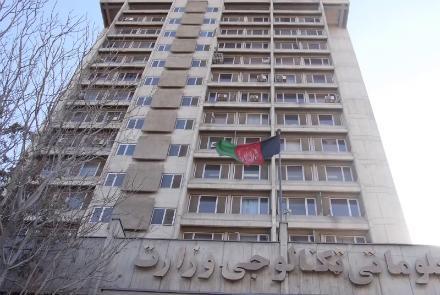Boosting up national revenues, in 2015, the Ministry of Finance (MoF) proposed a plan of a 10 percent tax on GSM subscribers to Afghan cabinet for approval. The cabinet ministers approved it, and as per the new rule, a 10 percent taxation was imposed on telecommunication services. Following the approval of the new law, the Ministry of Communication and Information Technology (MCIT) announced that as much as 80 million afghanis were collected in the week followed by the approval of the law. Officials at the MCIT promised that under Afghanistan Telecommunication Regulatory Authority (ATRA), it would develop Real Time Data Management Systems (RTDMS), a system that will connect with billing systems of all telecom companies, reconcile the 10 percent tax collected from the GSM subscribers, and ensure transparency in the collection of the taxes. The ministry however failed to install RTDMS to ensure accountability in revenues collected from 10 percent tax imposed on GSM subscribers.
In 2018, the MoF announced that as much as 8 billion and 40, 000,000 afghanis were collected. Following the statement by the MoF, Sayed Ahmad Shah Sadat, then the acting minister at the MCIT, claimed that as much as 70 percent of the tax collected was emblazed by high-ranking officials. With Mr. Sadat making such a claim, the Afghan MPs raised their voices, asking the government to stop deducting the 10 percent tax unless the RTDMS was installed but to no avail.
Following the critique by the MPs, officials at the MCIT, noted that delay in installing RTDMS was not the fault of the ministry. They stated that by duty ATRA and the MoF were accountable for installation of the RTDMS, something that yet has not been developed.
According to evidences, the MoF and ATRA have deliberately delayed installing the RTDMS. Though Afghan authorities made repeated vows that the MCIT would develop RTDMS within months, the deadlines expired and RTDMS was not developed. Audit experts say that in the absence of the RTDMS, the government officials can emblaze money open-handedly without being tracked.
With discontentment high over corruption existing in collection of 10 percent tax, President Ashraf Ghani, tasked a commission to investigate the issue. The Afghan MPs too tasked parliament’s commission of communication and telecommunication to launch a probe on the case. Reports issued by the two commissions showed that neither the MoF nor ATRA and MCIT did enough to develop and install the RTDMS.
After a three year delay, subsequently the MCIT on February 28, 2019, signed contracts with two foreign firms, LATRO and Bustos Group LLC. The government awarded an $11 million project to these companies to develop RTDMS, which is a long-awaited project planned to be implemented.
With the appointment of new acting minister at the MTCT, the question however is that will the ministry be able to develop RTDMS and bring accountability in collection of the 10 percent revenue?
Tahir Zaland, spokesperson for the MCIT told Etilaat-e-Roz that a part of the RTDMS will be developed by the end of November 2019 and it will be completed by the end of October 2020. “We have taken complete preparation for developing RTDMS. We have developed software and are just waiting for equipment and machineries for installation of the system and will receive the machineries by coming September.”
But Naser Timory, member of Integrity Watch Afghanistan, says that difference existing among government leaders is the “real hindrance” ahead to installation of RTDMS.
Findings show that the government has awarded this contract to US-based companies which do not seem to have track record of developing IT projects.
However as per the law of the National Procurement Authority (NP) private companies that fail to meet deadlines will be fined. Will the Afghan government get the RTDMS installed is yet a question that will be answered in the months ahead.




